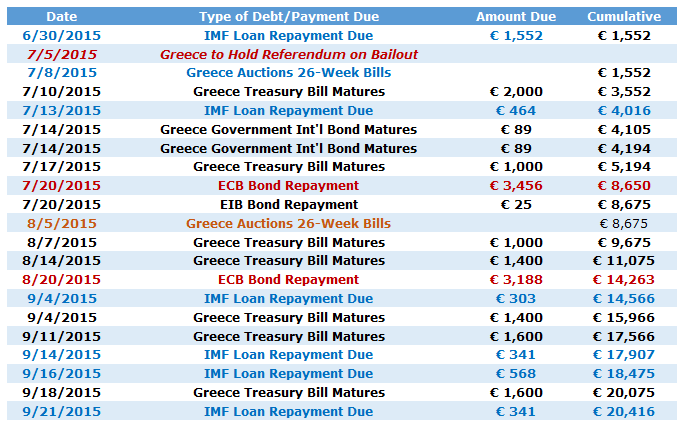- Greece set to default if no bailout agreement is reached
- Focus remains on Greek referendum on July 5
- A vote for “No” likely to cause significant market volatility
Key Dates for Greece Continue to Warn of Substantial Volatility

Data Source: Bloomberg, Wall Street Journal. Prepared by David Rodriguez
It seems as though the Greek Government has had a critical deadline in every single one of the past number of weeks, and still it remains solvent and a decline in Euro and broader financial market volatility suggests that danger has receded. Yet this is misleading for a simple reason: the central Greek Government has almost certainly run out of funds with which to pay mounting debts. Default is effectively guaranteed if it does not reach an agreement for a bailout extension with the EWG and IMF.
A Greek debt default would likely lead to a much-larger domestic crisis, an exit from the Euro Zone, and the establishment of an alternate Greek currency. This remains the major risk to broader financial markets and systemically-connected economies.
What’s the Most Important Date on the Calendar?
In concrete terms, the single most significant deadline on the calendar is likely the European Central Bank bond repayment due on July, 19—assuming that the Greek Government remains solvent up until that point. Ahead of that, a national referendum on July 5 will also prove potentially pivotal as a number of European leaders claim it is tantamount to a referendum on whether Greece will stay in the Euro Zone.
Current signs suggest that the Greek people will vote “No” and reject the current bailout offer from the Euro Working Group, and volatility is virtually guaranteed on such a result. Such an outcome would send negotiators on both sides back to the table and ostensibly strengthen Greek Prime Minister Tsipras’ hand in negotiations. It is difficult to say that this would make a deal more likely, however, and the stakes would grow ever-larger ahead of the potentially game-changing payment due to the European Central Bank on July, 19.
A look at forex market volatility prices for the Euro/US Dollar underlines the sense of urgency: some of the most sophisticated traders in the world believe that the coming four weeks will bring substantially more uncertainty than the coming year.
Euro Volatility Prices Substantially Higher in Near Term than Coming Year
 Data source: Bloomberg. Chart source: R, ggvis
Data source: Bloomberg. Chart source: R, ggvisEuro Reactions are Far from Predictable
We’re entering a critical stretch for the ongoing Greek sovereign debt crisis, but the clear difficulty is pinpointing the exact moment at which traders should take extra caution.
If the upcoming referendum does indeed produce a “No” result, we could see substantial Euro volatility and broader financial market turmoil. Heightened sovereign risks could discourage market makers from making prices in EUR pairs, and in effect this means that the Euro could both rally and fall sharply on any news headlines.
Any surprises could force substantial market moves, and traders should limit trading leverage—particularly in EUR pairs—ahead of the key dates. Caution is advised until we see a true breakthrough in negotiations.
Recommended Content
Editors’ Picks
EUR/USD holds below 1.0750 ahead of key US data

EUR/USD trades in a tight range below 1.0750 in the European session on Friday. The US Dollar struggles to gather strength ahead of key PCE Price Index data, the Fed's preferred gauge of inflation, and helps the pair hold its ground.
USD/JPY stays firm above 156.00 after BoJ Governor Ueda's comments

USD/JPY stays firm above 156.00 after surging above this level on the Bank of Japan's decision to leave the policy settings unchanged. BoJ Governor said weak Yen was not impacting prices but added that they will watch FX developments closely.
Gold price oscillates in a range as the focus remains glued to the US PCE Price Index

Gold price struggles to attract any meaningful buyers amid the emergence of fresh USD buying. Bets that the Fed will keep rates higher for longer amid sticky inflation help revive the USD demand.
Bitcoin Weekly Forecast: BTC’s next breakout could propel it to $80,000 Premium

Bitcoin’s recent price consolidation could be nearing its end as technical indicators and on-chain metrics suggest a potential upward breakout. However, this move would not be straightforward and could punish impatient investors.
US core PCE inflation set to signal firm price pressures as markets delay Federal Reserve rate cut bets

The core PCE Price Index, which excludes volatile food and energy prices, is seen as the more influential measure of inflation in terms of Fed positioning. The index is forecast to rise 0.3% on a monthly basis in March, matching February’s increase.